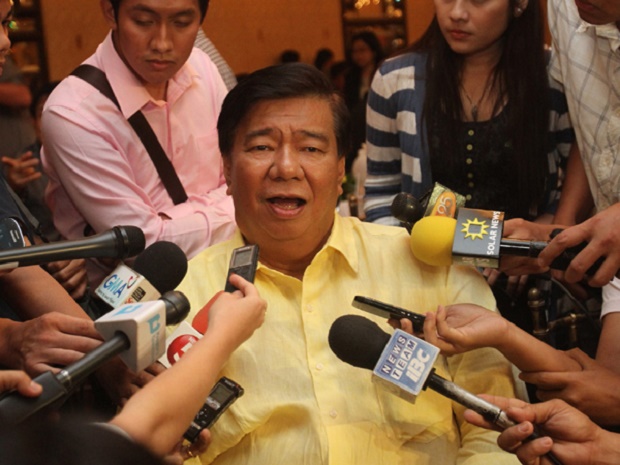Senate President Franklin Drilon on Thursday said he had asked the Commission on Appointments (CA) to study a possible amendment to a provision in the CA rules that allows a member to block the confirmation of government appointees for no reason at all, saying he wanted “to shield career officials from politics.”
Drilon’s move followed Senate Minority Leader Juan Ponce Enrile’s deferment of the appointment of seven career officials on Wednesday.
“I have asked the secretary of the CA to study how we can amend the rules so that Section 20 cannot be used arbitrarily, and in order that we can shield career officials from politics,” Drilon said.
But Enrile bucked the proposal and described it as a move to clip the powers of the opposition.
“That (provision) is the weapon of the opposition against the rapacity and irresponsibility of the ruling clique,” Enrile said at a Senate forum, adding that the rule had been in place since the time of President Manuel Quezon.
“Why are you going to destroy the power of the opposition in order to control the country? No way,” the Senate minority leader said.
Free hand
Enrile said he had blocked the confirmation of the seven career officials to give the next President a free hand in appointing people, especially ambassadors who will represent him. Ambassadors have a three-year term, he added.
As for blocking the appointment of an audit commissioner, Enrile said the auditor was in charge of guarding the use of public funds so the next President should be able to choose the auditor who could be tasked with checking the wrongdoing of the previous administration.
Enrile invoked Section 20 of the CA rules when he deferred the appointment of the seven officials until May 25 when Congress resumes session.
Deferred was the confirmation of the ad interim appointments of Isabel Dasalla-Agito as commissioner of the Commission on Audit and Nieves Osorio, commissioner of the Civil Service Commission.
Also blocked was the confirmation of five diplomats: Department of Foreign Affairs spokesperson and Assistant Secretary Charles Jose who was appointed ambassador to Malaysia; Denis Lepatan as ambassador to Norway (with concurrent jurisdiction over Iceland, Denmark, Finland and Sweden); Celia Anna M. Feria as ambassador to Spain (with concurrent jurisdiction over Andorra); Uriel Norman R. Garibay as ambassador to Kenya (with concurrent jurisdiction over Burundi, Union of the Comoro Islands, Congo, Malawi, Rwanda, Seychelles, Somalia, Tanzania, Uganda, South Sudan and as permanent representative to the United Nations Environmental Programme and UN Human Settlements Programme); and Lilybeth Deapera as ambassador to Chile (with concurrent jurisdiction over Peru and Ecuador).
‘Saddened’
Speaking at the Kapihan sa Senado on Thursday, Drilon said he was “saddened” by Enrile’s move, especially since the appointees were all career officials.
Asked whether Enrile had any political motive in derailing the appointments, Drilon said, “You can judge for yourself.”
He added: “There is no question on the qualifications of the career people to be confirmed to the posts that they were nominated for.”’
Some of the foreign posts had been vacant for quite some time, the Senate official said, adding: “I don’t see how public interest would have been harmed with the [officials’] confirmation. I could not see how public interest was served by the invocation of Section 20.”
A paper prepared by Drilon’s office showed that Section 20 was adopted verbatim from the 1968 rules of the CA.
“In 2003, the provision was amended to the effect that Section 20, which under the old rule cannot be invoked during the last two session days prior to an adjournment, can no longer be invoked during the last session prior to sine die adjournment,” the paper said, referring to Congress’ adjournment for an indefinite period.
Congress goes on sine die adjournment in June when the new president comes in.
Enrile is identified with the camp of Vice President Jejomar Binay, a rival of the administration party’s standard-bearer Mar Roxas for the presidential post. The Senate minority leader had been attacking the Aquino administration in recent weeks, and had moved for the reopening of the investigation on the Mamasapano, Maguindanao, massacre that led to the death of 44 Special Action Force troopers. Enrile had placed the blame for the massacre squarely on President Aquino.
